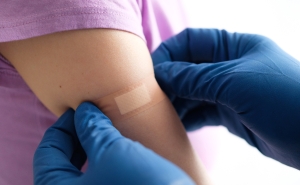Student Spotlight: Shae Nicolaisen
Shae Nicolaisen's MSPH field placement took her to Fortaleza, Brazil, where she worked with the city government’s Research and Planning Institute to implement a nutrition and diet quality survey for city youth.

Meet Shae Nicolaisen
- Degree Program: MSPH
- Area of Interest: Child and Adolescent Health
- Program Entry Year: 2023
- Hometown: Phoenix, Arizona
- Previous Degree(s) Earned: BS in Biology and BA in Global Health, Duke University
- Fun fact: I was a competitive swimmer for 15 years. I competed at the 2016 Olympic Trials in the 800-meter freestyle, and I also had the opportunity to swim for Duke University during my undergraduate studies.
What sparked your interest in public health?
My interest in public health was first sparked during my undergraduate studies. I had always been passionate about the idea of applying science to enhance societal well-being, but it was my first course in global health during my freshman year that truly captivated me. I realized that public health was my passion—an avenue through which I could work to address the root causes of health issues and tackle the societal inequities that perpetuate the uneven distribution of disease and disability across the globe. This realization set me on a path to dedicate my life to fostering systemic change to improve health outcomes for marginalized populations worldwide.
Why did you choose Bloomberg School of Public Health?
I selected the Bloomberg School because of its extensive and comprehensive approach to public health education. The School's commitment to a holistic curriculum—encompassing research, advocacy, program implementation, and evaluation—was particularly appealing. I was impressed by the breadth and depth of work being conducted by the faculty, who are recognized as leaders in the field. I felt that the School offered the ideal environment for both academic and professional growth, providing me with the tools and insights needed to become an effective public health practitioner.
What led you to join the Department of Population, Family, and Reproductive Health?
The Department of Population, Family and Reproductive Health (PFRH) stood out to me because of its focus on children's health and its flexibility in allowing students to explore various aspects of public health. I was eager to delve into topics such as research methods, data analysis, program evaluation, and advocacy, all while concentrating on child health. The department's esteemed faculty, renowned for their groundbreaking work, further motivated me to join and immerse myself in their innovative research and practice.
The course was transformative in shifting my perspective from a deficits-based to a strengths-based approach in public health practice.
What is one experience in PFRH that stands out as a favorite or most memorable?
One of the most impactful experiences was the course titled "Children in Crisis: An Asset-Based Approach to Working with Vulnerable Youth," taught by Terri Powell, PhD, MA, and Beth Marshall, DrPH ’11, MPH ’03. The course was transformative in shifting my perspective from a deficits-based to a strengths-based approach in public health practice. I particularly valued the presentations from local Baltimore youth organizations that apply these principles to positively impact the community. This experience deepened my appreciation for how asset-based strategies can drive meaningful change in vulnerable populations.
Tell us about your field placement.
This summer, I am honored to be a Global Health Established Field Placement awardee and a Bloomberg Center for Public Innovation Summer Scholar in Fortaleza, Brazil. I am collaborating with the city government’s Research and Planning Institute (Ipplan) to implement a survey assessing the nutrition and diet quality of youth ages 15 to 29 participating in city programs. The findings will guide a policy proposal aimed at enhancing dietary quality among the city's youth. Additionally, I am continuing my role as a graduate research assistant with two BSPH centers. I support the Center for Indigenous Health (Great Lakes Hub) in managing data for the Healing Pathways project, a study exploring the impact of family and culture on mental health and substance use among Indigenous adolescents and adults. I am also contributing to the evaluation of a school-entry catch-up vaccination program in Zambia with the International Vaccine Access Center, including qualitative analysis of caregiver interviews scheduled for the fall.
What do you hope to do or accomplish after graduation?
After graduation, I aspire to focus on two main goals in global health research and practice: First, to develop strategies that restructure societal and health systems to better support health and development throughout the lifespan; and second, to leverage evidence-based practices to drive transformative changes in policy and practice. My overarching ambition is to conduct research that has a meaningful impact beyond academia while advocating for vulnerable populations and driving substantial progress toward a healthier and more equitable world. Although I am still exploring the exact path this will take, I am enthusiastic about the opportunities and challenges that lie ahead.





